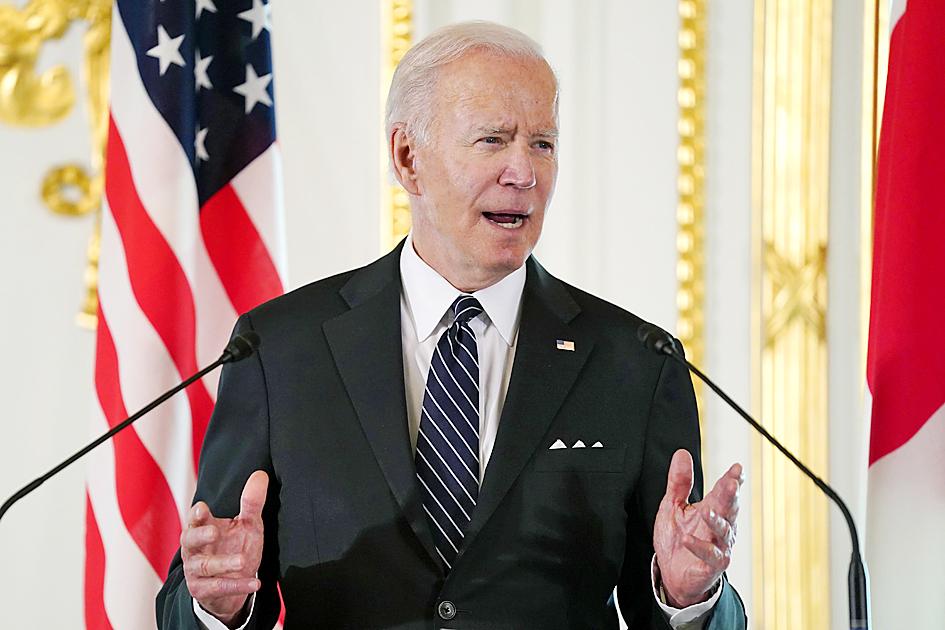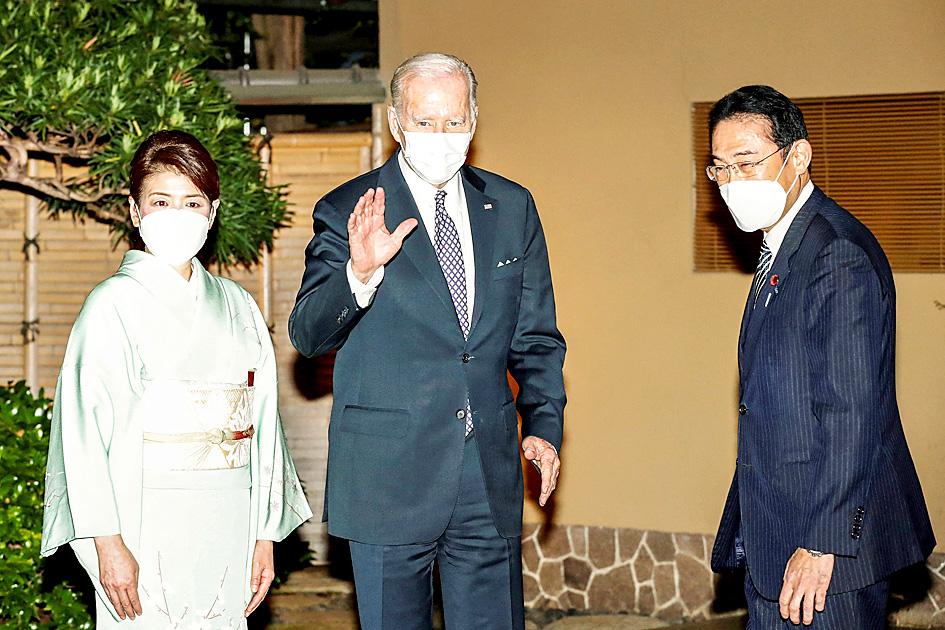US President Joe Biden yesterday vowed that US forces would defend Taiwan militarily in the event of a Chinese attack in his strongest statement to date on the issue.
Beijing is already “flirting with danger,” Biden said following talks with Japanese Prime Minister Fumio Kishida in Tokyo, in which the pair agreed to monitor Chinese naval activity and joint Chinese-Russian exercises.
Asked if Washington was willing to get involved militarily to defend Taiwan, he replied: “Yes.”

Photo: AP
“That’s the commitment we made,” Biden said. “We agreed with the ‘one China’ policy, we signed on to it ... but the idea that it can be taken by force is just not appropriate, it would dislocate the entire region and would be another action similar to Ukraine.”
Biden directly linked the fates of Ukraine and Taiwan, saying that sanctions on Russia must exact a “long-term price,” because otherwise “what signal does that send to China about the cost of attempting to take Taiwan by force?”
He warned that Beijing was “flirting with danger right now by flying so close and all the maneuvers undertaken,” referring to a growing number of Chinese sorties, naval exercises and other power projections in the Taiwan Strait.

Photo: Reuters
In Washington, the White House said that Biden was not diverging from the US’ official “one China” policy, which includes the commitment to “provide Taiwan with the military means to defend itself.”
“Our policy has not changed,” an official said.
In Taipei, Ministry of Foreign Affairs spokeswoman Joanne Ou (歐江安) thanked Biden and the White House for their “rock solid” commitment to Taiwan.
The threat China poses to security in the Taiwan Strait is of great concern to the international community, Ou told reporters, adding that Taiwan’s determination to defend its freedom and democracy has never changed.
In Beijing, Chinese Ministry of Foreign Affairs spokesman Wang Wenbin (汪文斌) said that “no one should underestimate the firm resolve, staunch will and strong ability of the Chinese people in defending national sovereignty and territorial integrity.”
“China has no room for compromise or concession,” Wang said.
Japanese public broadcaster NHK predicted that Biden’s comments would spark debate, as they appear to contradict the long-running US policy of “strategic ambiguity” toward Taiwan.
Biden made similar comments in October last year when asked during a CNN town hall whether the US would come to Taiwan’s defense, responding: “Yes, we have a commitment to do that.”
In August last year, he listed Taiwan among nations the US has a commitment to defend in comments to ABC News.
In both instances, the White House made statements shortly afterward saying that US policy toward Taiwan had not changed.
Meanwhile, Kishida called for stability in the Taiwan Strait and said that Tokyo was committed to boosting its defense spending, a sensitive subject in a nation with constitutional limits on its military.
“Japan will fundamentally strengthen its defense capacity, and to back that up will significantly increase its defense spending,” Kishida told a news conference held with Biden. “We do not rule out any options, including [acquiring] the capacity to counterattack.”

SECURITY: As China is ‘reshaping’ Hong Kong’s population, Taiwan must raise the eligibility threshold for applications from Hong Kongers, Chiu Chui-cheng said When Hong Kong and Macau citizens apply for residency in Taiwan, it would be under a new category that includes a “national security observation period,” Mainland Affairs Council (MAC) Minister Chiu Chui-cheng (邱垂正) said yesterday. President William Lai (賴清德) on March 13 announced 17 strategies to counter China’s aggression toward Taiwan, including incorporating national security considerations into the review process for residency applications from Hong Kong and Macau citizens. The situation in Hong Kong is constantly changing, Chiu said to media yesterday on the sidelines of the Taipei Technology Run hosted by the Taipei Neihu Technology Park Development Association. With

A US Marine Corps regiment equipped with Naval Strike Missiles (NSM) is set to participate in the upcoming Balikatan 25 exercise in the Luzon Strait, marking the system’s first-ever deployment in the Philippines. US and Philippine officials have separately confirmed that the Navy Marine Expeditionary Ship Interdiction System (NMESIS) — the mobile launch platform for the Naval Strike Missile — would take part in the joint exercise. The missiles are being deployed to “a strategic first island chain chokepoint” in the waters between Taiwan proper and the Philippines, US-based Naval News reported. “The Luzon Strait and Bashi Channel represent a critical access

‘FORM OF PROTEST’: The German Institute Taipei said it was ‘shocked’ to see Nazi symbolism used in connection with political aims as it condemned the incident Sung Chien-liang (宋建樑), who led efforts to recall Democratic Progressive Party (DPP) Legislator Lee Kun-cheng (李坤城), was released on bail of NT$80,000 yesterday amid an outcry over a Nazi armband he wore to questioning the night before. Sung arrived at the New Taipei City District Prosecutors’ Office for questioning in a recall petition forgery case on Tuesday night wearing a red armband bearing a swastika, carrying a copy of Adolf Hitler’s Mein Kampf and giving a Nazi salute. Sung left the building at 1:15am without the armband and apparently covering the book with a coat. This is a serious international scandal and Chinese

COUNTERINTELLIGENCE TRAINING: The ministry said 87.5 percent of the apprehended Chinese agents were reported by service members they tried to lure into becoming spies Taiwanese organized crime, illegal money lenders, temples and civic groups are complicit in Beijing’s infiltration of the armed forces, the Ministry of National Defense (MND) said in a report yesterday. Retired service members who had been turned to Beijing’s cause mainly relied on those channels to infiltrate the Taiwanese military, according to the report to be submitted to lawmakers ahead of tomorrow’s hearing on Chinese espionage in the military. Chinese intelligence typically used blackmail, Internet-based communications, bribery or debts to loan sharks to leverage active service personnel to do its bidding, it said. China’s main goals are to collect intelligence, and develop a